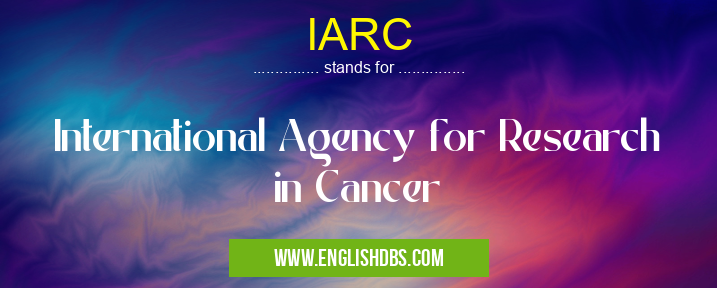What does IARC mean in RESEARCH
IARC stands for the International Agency for Research on Cancer. It is a specialized cancer agency of the World Health Organization (WHO). The IARC is recognized as the leading authority in the field of cancer research and provides scientific leadership in the global fight against cancer.

IARC meaning in Research in Academic & Science
IARC mostly used in an acronym Research in Category Academic & Science that means International Agency for Research in Cancer
Shorthand: IARC,
Full Form: International Agency for Research in Cancer
For more information of "International Agency for Research in Cancer", see the section below.
IARC's Mission
The IARC's mission is to promote international collaboration in cancer research, to stimulate cancer research, and to develop scientific strategies for cancer control. The agency focuses on the following key areas:
- Cancer surveillance: Collecting and analyzing data on cancer incidence, mortality, and survival rates worldwide.
- Cancer research: Conducting and supporting research on cancer causes, prevention, diagnosis, treatment, and palliation.
- Cancer control: Developing and evaluating strategies for cancer prevention and control, including public health interventions and health policy.
IARC's Role
The IARC plays a crucial role in global cancer research and control:
- Provides scientific evidence: IARC conducts and synthesizes research to provide evidence-based recommendations for cancer prevention and control.
- Classifies carcinogens: The agency classifies substances, mixtures, and exposures as carcinogens based on available scientific evidence.
- Develops guidelines: IARC issues guidelines for cancer prevention, diagnosis, treatment, and palliation.
- Promotes collaboration: IARC fosters international collaboration among cancer researchers, policymakers, and healthcare professionals.
- Provides training: The agency offers training programs to enhance capacity in cancer research and control in developing countries.
Essential Questions and Answers on International Agency for Research in Cancer in "SCIENCE»RESEARCH"
What is the International Agency for Research on Cancer (IARC)?
The International Agency for Research on Cancer (IARC) is a specialized cancer agency forming part of the World Health Organization (WHO). It is the leading intergovernmental organization in the field of cancer research, and is responsible for coordinating and conducting research on the causes of human cancer, the mechanisms of carcinogenesis, and developing scientific strategies for cancer control.
What are the main activities of IARC?
IARC's main activities include:
- Conducting research on the causes of cancer
- Evaluating the carcinogenicity of chemical, physical, and biological agents
- Developing and promoting cancer prevention and control strategies
- Providing scientific advice to governments and other organizations on cancer-related issues
How does IARC evaluate the carcinogenicity of substances?
IARC evaluates the carcinogenicity of substances through a rigorous process that involves:
- Gathering and reviewing scientific data on the substance
- Convening a group of experts to assess the data and make a determination on the substance's carcinogenicity
- Publishing the results of the evaluation in a monograph
What are the IARC Monographs on the Evaluation of Carcinogenic Risks to Humans?
The IARC Monographs on the Evaluation of Carcinogenic Risks to Humans are a series of publications that summarize the scientific evidence on the carcinogenicity of specific substances. The monographs are widely recognized as the authoritative source of information on the carcinogenicity of chemicals, physical agents, and biological agents.
How can I access the IARC Monographs?
The IARC Monographs are available online on the IARC website. You can search for specific substances or browse the monographs by topic.
Final Words: The IARC is a vital organization in the global fight against cancer. Its scientific leadership and evidence-based recommendations have contributed significantly to our understanding of cancer and the development of effective strategies for its prevention and control.
